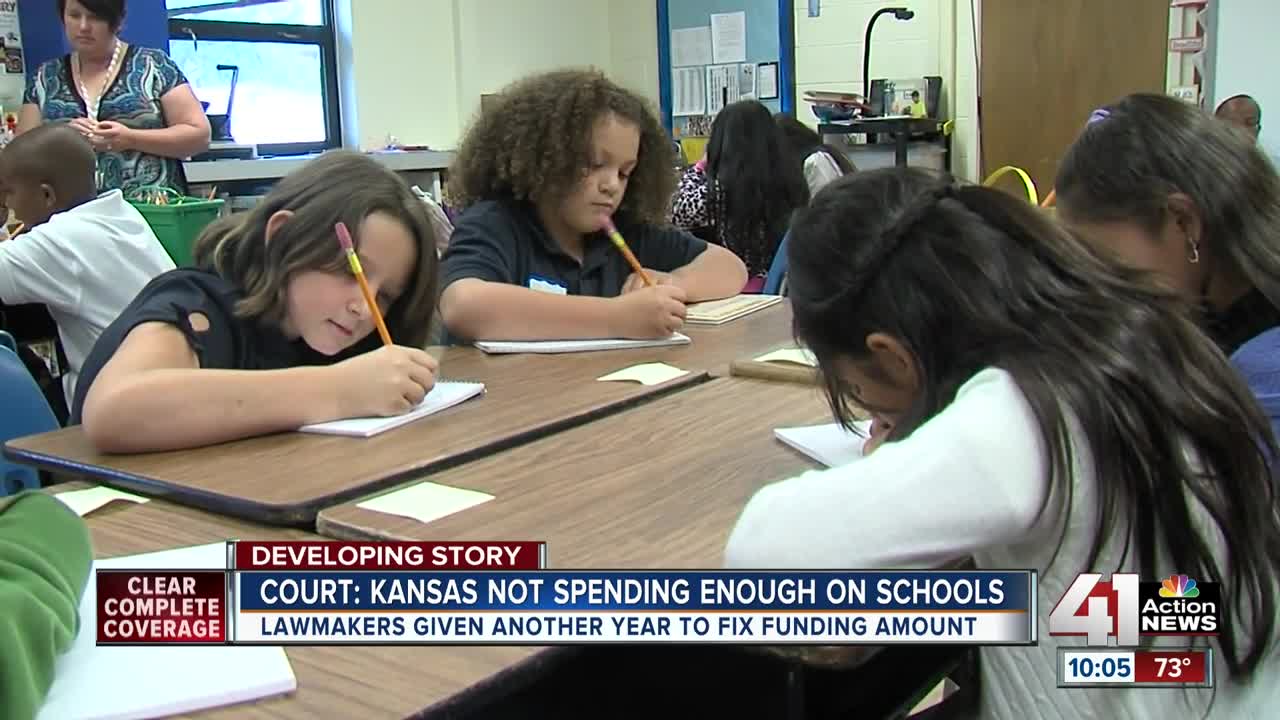TOPEKA, Kan. (AP) — The Kansas Supreme Court Monday ruled for the third time in two years that the state's spending on public schools is inadequate despite an increase approved earlier this year, but gave the state another year to come up with more money.
The high court rejected arguments from the state that a new law phasing in a $548 million increase in funding over five years is enough to provide a "suitable" education for every child as specified in the state constitution. But in a nod to the Legislature's efforts, the court delayed its mandate until June 30, 2019, or until further order of the court.
RELATED | KS gov. candidates weigh in on school funding
Its decision allows Kansas schools to remain open for the upcoming school year.
The court said that by making "financial adjustments" the state can satisfactorily address the remaining issues, largely to account for inflation in its school finance plan.
"This action acknowledges the State's position — that the 2019 legislature's efforts and the amount of money added for the approaching school year should permit such an extension through the 2019 regular legislative session," the court wrote in its 39-page ruling.
The court last year found that parts of the school finance law were unfair to poor districts. The court said in its ruling Monday that the new law resolved those problems.
"Armed with this Court decision today, the Kansas Legislature has a precise roadmap to guide it to constitutionality," said Alan Rupe, one of the attorneys representing the school districts who sued. "For the sake of all Kansas kids, we hope the Legislature arrives soon at that destination."
Kansas attorney General Derek Schmidt highlighted the court's finding that the state's school funding system is equitable and he said the court has set out a clear path for how the Legislature can resolve the remaining funding issue. Schmidt said compliance with the order will still require the Legislature to approve significantly more funding starting next year.
"I continue to believe that Kansans should be given the chance to vote on a constitutional amendment to indicate whether this litigation-driven funding system is really how they want school-funding decisions to be made," Schmidt said.
Schmidt and other conservatives have continued calls that started last April for a constitutional amendment barring the Supreme Court from determining financial adequacy, giving full decision-making power to the Legislature.
Four school districts that sued the state in 2010 argued that the increase still left the state as much as $1.5 billion a year short of what was necessary. The state now spends more than $4 billion a year on aid to its 286 local school districts.
The Republican-controlled Legislature boosted income taxes last year to close projected budget shortfalls, but part of the hike went to increase spending on public schools in response to a March 2017 order from the court. But the justices declared in October that the higher amount still wasn't enough to comply with the state constitution.
Lawmakers and Republican Gov. Jeff Colyer were looking this year to increase education funding without raising taxes — and they've been aided by a year of monthly surpluses in tax collections. But a majority of the seven justices were openly skeptical that the new law was adequate during a hearing in May.
WATCH: Gov. Colyer talks school funding decision
Colyer called the court's ruling a success, saying in a statement that equity was achieved and so will adequate funding in the next legislative session.
"I look forward to building upon the work we did together to address the remaining issues identified in the ruling," the governor said, He added that he still has no intention of raising taxes to fund the increased school budget.
Kansas has been in and out of school funding lawsuits for several decades. The state constitution requires legislators to "make suitable provision for finance" of the state's "educational interests," and the Supreme Court has ruled it's a requirement to ensure that all children receive a suitable education, regardless of whether they live in rich or poor areas.


